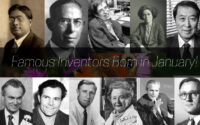Famous Inventors Born in November!
Explore the famous inventors born in November with IDiyas. From groundbreaking scientists like Marie Curie, the discoverer of radium, to creative minds like the Fourth Earl of Sandwich, credited with popularizing the sandwich, November has given rise to numerous visionaries. Arranged chronologically by their birth year, the following prominent individuals transformed the world through their remarkable achievements. Let’s celebrate their enduring contributions to science, technology, and everyday life.

Robert B Laughlin
Date of Birth: November 1, 1950
Notable Works:
Fractional Quantum Hall Effect
- Developed the Laughlin Wavefunction in 1983, providing a groundbreaking explanation for the fractional quantum Hall effect.
- Inspired Project Malta at Google X with his 2017 paper, Pumped Thermal Grid Storage with Heat Exchange.

John Montagu, 4th Earl of Sandwich
Date of Birth: November 3, 1718
Notable Works:

The Sandwich (1762)
- Popularized the sandwich as a convenient meal, with his name becoming synonymous with this food preparation method.
Naval Administration
- Served as First Lord of the Admiralty during the American Revolution, playing a significant role in naval strategy and exploration.
- Promoted Captain James Cook’s voyages, leading to the naming of the Sandwich Islands (Hawaii) in his honor.

Alois Senefelder
Date of Birth: November 6, 1771

Notable Works:
Invention of Lithography
- Developed the printing technique in the 1790s using Solnhofen limestone, revolutionizing the printing process.
“Vollständiges Lehrbuch der Steindruckerei” (1818)
- Published a comprehensive manual on lithography, which served as a practical guide and history of the invention.



Maria Skłodowska-Curie
Date of Birth: November 7, 1867
Notable Works:
Discovery of Polonium and Radium
- Identified two new elements: polonium, named after her native Poland, and radium, using innovative techniques for isolating radioactive isotopes.
Pioneering Research on Radioactivity
- Coined the term “radioactivity” and proved that it was a property of atoms, which challenged the indivisibility of atoms and laid groundwork for nuclear physics.
Nobel Prize in Physics (1903)
- Shared with Pierre Curie and Henri Becquerel for research on radiation phenomena. She became the first woman to win a Nobel Prize.
Nobel Prize in Chemistry (1911)
- Recognized for her contributions to chemistry through the discovery of radium and polonium and her studies on their properties.
Medical Applications of Radioactivity
- Conducted the first studies on treating neoplasms using radioactive isotopes, contributing to cancer treatment.


